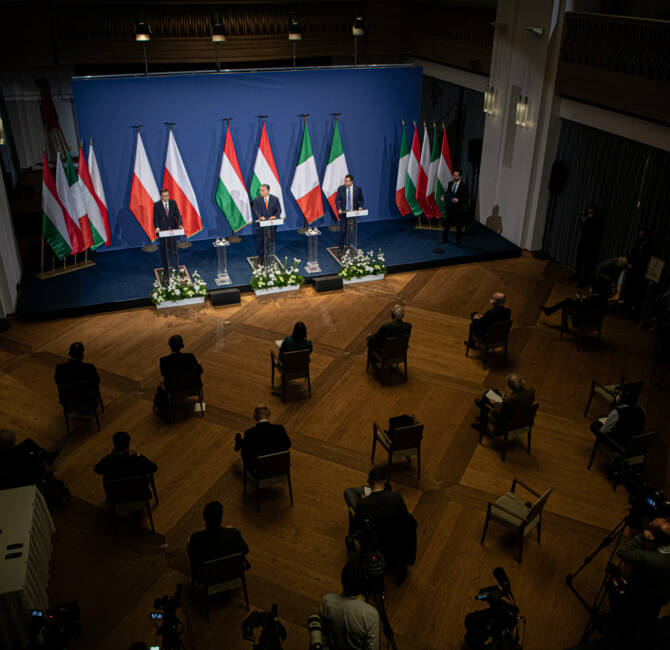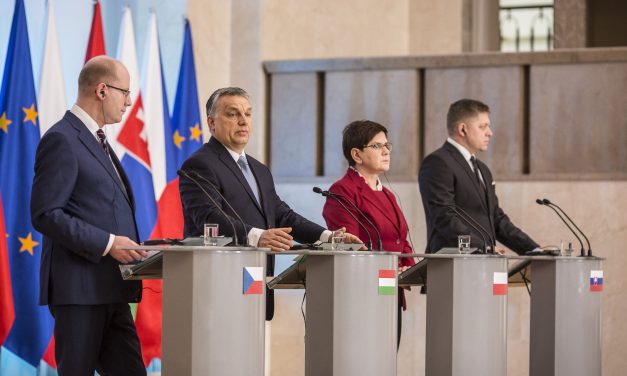Poland/USA – It is always surprising to note that Polish conservatives’ views on the United States are completely different from those of the French or Germans, even and especially in the context of the current Russian-Ukrainian crisis. This may be a truism, but it should not be forgotten, especially in these increasingly difficult times for Poland and the Trimarium region in terms of foreign policy, but actively reflected upon. The initial geopolitical situation is well known: Poland being squeezed between Germany and Russia, its strategy has always been to turn to peripheral allies capable of providing a guarantee of political survival against these two overpowering neighbours, without having any territorial interests themselves. In the practical dressing of this doctrine, however, it can be seen that these external powers were generally, due to historical conditions, those who certainly showed a pragmatic interest in Poland’s survival, but whose ideology actually hindered rather than promoted Polish conservatism.
A first example is undoubtedly the alliance with Napoleon, which is still appreciated today, and which certainly did great service in re-establishing Poland as a vassal state of France and partially annulling the “partitions”, but whose real policy was based precisely on those “revolutionary values” which, in the long run, were to undermine the fundamental spiritual values not only of Polish society, but also of every other European society.
Another example is the alignment of the newly founded Polish national state after the end of the First World War with the Western Entente powers, which also pursued a resolutely anti-Christian, internationalist and plutocratic ideology – an alignment that was also attempted during the Second World War, but which ultimately resulted in territorial mutilation and two generations of Soviet domination.
The current alliance with the United States is also part of this continuity, and it is to be feared that the negative consequences will only become apparent when it is too late.
Certainly, the idealised image that many Poles have of the United States seems miles away from such fears, especially since it has apparently been confirmed by Donald Trump’s presidency and his short honeymoon with the current Polish government. From a Polish perspective, the US is seen as the ultimate model of a freedom-oriented republican order, deeply rooted in the Christian faith and driven by a fierce desire for individual freedom; two factors that seem to fit in the most beautiful way with Poland’s (Catholic) religious convictions and the Polish tradition of the ‘liberum veto’. It is also understandable that the United States became an ideal image of prosperity, democracy and freedom during the communist dictatorship and, from the Polish point of view, seems to be a much envied model of success due to its practical comparison with the disastrous conditions of the real socialism.
But the United States of the 21st century has little to do with such an ideal vision, which is several generations out of date, as was already criticised in the 20th century by many Western intellectuals, who did not know the United States by contrast with real communism, but rather by the critical examination of the real consequences of Americanisation (and who, in fact, only confirmed Toqueville’s lucid fears from the 19th century…). Even then, it was obvious, even for France, that the Anglicisation of language would ultimately lead to the decline of all other European mother tongues, that the ultra-liberal capitalism of the United States would lead to a dictatorship of a few large oligopolies, that the Americanisation of culture (and particularly gastronomy) would lead to a worrying decline in one’s own cultural development, and that the naive and often ignorant and self-centred transposition of US democratic criteria to non-Western states would lead to an unending series of foreign policy disasters, the consequences of which are that
not only the USA, but also many European states today are viewed in an extremely unfavourable light throughout the world.
In the meantime, this development has been enriched by other disturbing phenomena. A dispassionate look at the reality of life in the United States shows the extent to which it has fallen under the sway of the self-destructive ideology that has often been called ‘political correctness’ or ‘wokism’, and which is reaching an unprecedented peak under the presidency of Joe Biden.
Today, the United States is no longer synonymous with individual freedom, democracy and joie de vivre, but rather with the ruthless imposition of multiculturalism, LGBTQ ideology, the transformation of democratic structures into oligarchic ones, mass immigration, de-Christianisation, casino capitalism, the condemnation of one’s own historical past, the persecution of allegedly toxic masculinity and much more.
So there should be no illusions: in the present political circumstances at least, an alliance with the United States is becoming increasingly unnatural for the conservative Polish government, and the guarantee of the political survival of the Polish state would have to be paid for at a high price, namely by the abandonment of domestic cultural autonomy, which is hardly less serious. But these remarks should by no means be read as a call to break away from the long-standing partnership with the US or even to submit to either of the two immediate neighbours, for on the one hand, the current dominant ideology in Germany (and the EU) is hardly different from that of the US, while on the other, Russian so-called conservatism is little more than a front for a fragile oligarchy, whose alleged ‘love’ for Western Christian culture was demonstrated just a few weeks ago when tens of thousands of Muslim migrants were flown into the forests of Belarus to be sent against the Polish border.
The purpose of these lines is rather to show the reader how Poland, with the exception of its current Central European allies, first and foremost Hungary, is effectively on its own in world politics, and that even its traditional partners such as the United States will demand a high price for their support at best, or refuse it altogether in the worst case – which is also a painful experience of Polish politics in the 18th, 19th and 20th centuries. It therefore seems essential to take a pragmatic and deliberately pessimistic look at reality and coldly calculate, beyond naive hopes and idealisations, the positive and negative consequences that different constellations of alliances can actually offer, the price they would demand and the actual stability they can develop in the long run. The fact that all potential partners can therefore only be viewed with great scepticism leads to only one conclusion:
Poland must change its unilateral orientation towards the United States and urgently seek other partners who, even if they are of less practical military significance, can create a foreign policy climate in which Poland is welcomed with sympathy and respect, even outside the beaten track of the East-West context, as soft power will continue to be of great importance in the 21st century.
The first thing to think about is intensifying relations with modern “middle powers” that have so far hardly been taken into account in Polish foreign policy, such as Japan, South Korea, India, Brazil, Mexico and many others. Another key point is the urgent development of the Visegrad alliance system and the idea of the Trimarium, both of which have been regularly put forward for a generation now as the ultimate goal of Polish European policy, but which in reality have had little success, and whose very essence seems to be threatened by the recent elections in the Czech Republic. It is therefore more urgent than ever to provide this alliance with solid structures, both in terms of content and institutionally, so as to be able to guarantee the pursuit of common goals, even outside of domestic political situations, and to finally establish that economic and political cooperation of the Trimarium states which, in the face of the current threat not only from the East but also from the West, urgently needs to be intensified. The window of opportunity for such an autonomous Polish foreign policy is getting smaller and smaller as the conflict with the European Union and the Federal Republic of Germany intensifies – all the more so as the forthcoming “Conference on the Future of Europe” will probably result in developments that could further marginalise Poland’s current position in Europe. It is to be hoped that the Polish government, currently badly shaken by disagreements over covid policy, still has the energy and vision to make the most of the final year of its governmental majority…




